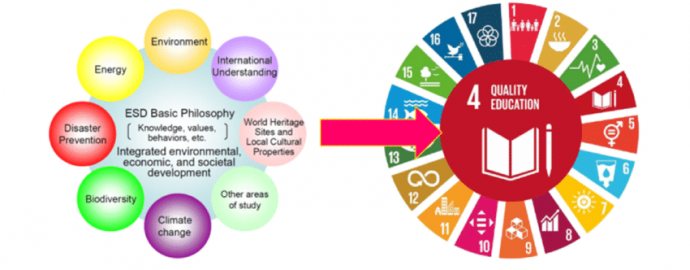
Education for Sustainable Development
In a world where environmental changes are accelerating and resources are rapidly depleting, the importance of sustainable development has never been more apparent. Education for Sustainable Development (ESD) stands out as a transformative approach that equips individuals with the knowledge and principles needed to address some of the most urgent challenges we face today.
Let’s delve into the true meaning of sustainable development and the role education plays in achieving it.
Why is Education for Sustainable Development Essential?
ESD is critical because it helps individuals recognize the interconnectedness of the environment, society, and the economy. It fosters a global sense of unity, promoting the idea that we must work together to ensure a healthy, habitable Earth for future generations. By viewing humanity as a collective, we can focus on safeguarding the planet for those who come after us.
The Role of Education in Advancing Sustainable Development
Addressing the complex challenges posed by environmental degradation and economic instability requires a strong foundation in education. Education in sustainability empowers people to adopt environmentally friendly practices and become agents of change.
- Fosters Critical Thinking
Through education, individuals develop critical thinking skills, enabling them to approach challenges from multiple perspectives. This helps them identify root causes and create effective solutions for pressing issues like climate change, pollution, and resource depletion. - Instills Ethical Responsibility
Education promotes a deep sense of moral responsibility toward both the environment and society. It emphasizes values like social justice, empathy, and stewardship, guiding individuals to make choices that benefit both present and future generations. - Empowers Individuals to Take Action
With the right knowledge and skills, educated individuals are empowered to make meaningful changes in their communities. ESD encourages participation in local sustainability initiatives, supports advocacy for policy changes, and inspires the adoption of eco-friendly lifestyles. - Promotes Innovation and Research
Education fuels progress in research and technology, which are essential for advancing sustainable solutions. By fostering an inquisitive mindset, education encourages the development of sustainable technologies, renewable energy sources, and other eco-conscious innovations. - Enhances Resilience
Education builds resilience by helping individuals and communities adapt to changing environmental and economic conditions. It equips people with the knowledge needed to make informed decisions that strengthen their capacity to handle challenges. - Encourages Global Citizenship
ESD transcends borders, cultivating a global perspective that fosters cooperation and empathy among people from diverse backgrounds. It inspires individuals to unite and collaborate on global challenges, promoting a sense of shared responsibility for the planet. - Supports Policy Advocacy
Education provides the knowledge necessary for individuals to advocate for sustainable policies. Informed citizens can engage in thoughtful debates and influence the development of policies that prioritize environmental protection and social welfare. - Promotes Sustainable Living
Education encourages individuals to make more sustainable lifestyle choices. From reducing waste to embracing responsible consumption, ESD helps people understand how their personal actions can contribute to environmental preservation. - Prepares Future Generations
By preparing the next generation with the knowledge, skills, and values to address global sustainability challenges, education ensures that future leaders are equipped to create a more sustainable world.
In essence, education empowers individuals to think critically, solve problems creatively, and contribute to long-term solutions for global issues. Understanding the interconnectedness of ecological systems and adopting environmentally responsible behaviors are central to mitigating challenges like climate change and resource depletion.
Objectives of Education for Sustainable Development
The key goals of ESD include:
- Building Environmental Awareness: Educating individuals on ecosystems, ecological processes, and the impact of human activities on the environment.
- Promoting Ethical Decision-Making: Instilling a sense of responsibility for the environment and society, encouraging individuals to make choices that contribute to sustainability.
- Developing Critical Thinking Skills: Giving students the tools to assess environmental challenges and devise effective solutions.
- Celebrating Cultural Diversity: Encouraging dialogue and recognizing cultural differences, which allows for the sharing of ideas and practices related to sustainability.
- Encouraging Local Initiatives: Motivating individuals and communities to take action on sustainability issues that are relevant to their local context.
- Supporting Green Economies: Education drives growth in sustainable industries, helping to create jobs in green sectors.
- Fostering Global Citizenship: ESD promotes understanding and empathy across cultures, cultivating a sense of global responsibility.
How and Where is Sustainable Development Being Implemented?
The principles of sustainable development are being applied across various sectors, such as:
- Education: ESD is integrated into school curricula worldwide to teach sustainability concepts.
- Business: Companies are prioritizing environmentally responsible practices and social impact as part of their corporate strategies.
- Agriculture: Sustainable farming practices aim to reduce environmental harm while maintaining food production.
- Energy: The shift to renewable energy sources is essential for reducing carbon emissions and creating a sustainable future.
- Urban Development: Sustainable urban planning focuses on efficient resource use and the incorporation of green spaces in cities.
- Healthcare: Sustainable healthcare initiatives aim to reduce waste and address health inequities.
- Policy-making: Governments are enacting laws and regulations that promote sustainable resource management and environmental protection.
Conclusion
Sustainable development offers a pathway to a better future, but achieving it requires a focus on education. Education for Sustainable Development equips individuals with the knowledge, skills, and values necessary to tackle the complex issues of today’s world. As we navigate the challenges of an ever-changing global landscape, investing in ESD remains one of the most effective ways to build a more sustainable, equitable, and prosperous future for all.

Content writer, educationist, teacher, researcher, social media manager, and a SEO manager from lahore. She has been working as a freelance academic and non-academic writer for more than 20 years now. She has a passion to learn new things and has a knack for writing and she combines both things to produce write ups she pours her heart out in.

